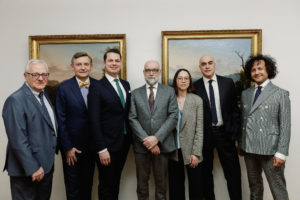Introduction
‘Crimea – the Golden Island in the Black Sea’. This was the title of an exhibition which took place in the Allard Pierson Museum (APM) in Amsterdam from February till September 2014. Works of art from several museums in Crimea had been transferred to Amsterdam with an export authorization, issued by the Ukraine Government. In March 2014 the Parliament of the Autonomous Republic of Crimea decided to join Russia.
After the exhibition APM did not know to whom to return the works of art. The Crimean museums started a procedure before the Court of Amsterdam against APM. The State of Ukraine intervened in that procedure.
The Amsterdam Court issued its judgment on 14 December 2016.
Procedure
Both the Crimean museums and the State of Ukraine claimed from APM to return the works of art to them.
The museums argued that APM had the objects on the basis of an operational agreement in which APM had guaranteed to return the objects to the museums after the exhibition. The museums and not the State of Ukraine are the proprietor of the objects.
The State of Ukraine argued that the works of art are the cultural heritage of Ukraine. The Law of Ukraine On Protection of Archaeological Heritage states in article 18 that cultural heritage and archaeological objects are the property of the State of Ukraine. Furthermore the State argued that the export license, which was valid until the end of the exhibition was expired. As a result of that they are considered unlawfully exported.
Ownership
The Court of Amsterdam did not decide upon the question who is the lawful owner of the works of art. On the basis of article 1012 of the Dutch Code of Civil Procedure the ownership will be determined by the national law of the State which has brought proceedings for recovery after the return of the works of art.
Cultural Property
The Court established that all parties involved agreed that the works of art belong to the cultural heritage. In the UNESCO Treaty of 1970 `cultural property’ is defined as property which, on religious or secular grounds, is specifically designated by each State as being of importance for archaeology, prehistory, history, literature, art or science. The museum claimed that the works of art belong to the cultural heritage of Crimea. The Republic of Crimea however is not recognized as a State. At the time of export to The Netherlands Crimea was a part of Ukraine.
Illicit (Unlawful) Export
The Parties to the UNESCO Convention recognize that the illicit import, export and transfer of ownership of cultural property is one of the main causes of the impoverishment of the cultural heritage of the countries of origin of such property. Although at the time of export of the works of art, there was no illicit (unlawful) export, as the State of Ukraine had issued an export licence, at the end of the exhibition, the licence was expired.
Decision
The Court decided that the expiration of the export licence was to be considered as equivalent to illicit export. Therefore the works of art should be returned to Ukraine. However the Court also decided that the judgment would not be enforceable forthwith. If in appeal the Court of Appeal would decide differently and in the meantime the works of art would have been returned to Ukraine, APM would be in an impossible position, as the Allard Pierson Museum would not be able to return the works of art to the Crimea museums.
The museums have the possibility to appeal against the judgment of the Amsterdam Court until 14 March 2017.
Roderick D. Rischen
Rischen & Nijhuis advocaten



